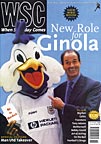 Scotland's media have been unimpressed by novel approaches to management at Celtic. Gary Oliver describes the rum goings-on at Parkhead
Scotland's media have been unimpressed by novel approaches to management at Celtic. Gary Oliver describes the rum goings-on at Parkhead
While the rest of the press spent the month of September debating whether Bill Clinton remained fit for office, Scotland’s football writers had already begun an impeachment. Celtic’s general manager Jock Brown was the accused, his grand jury appearance at the club’s annual general meeting allowing various hacks to be Kenneth Starr for a day.
In contrast to his customary high profile as the mouthpiece of the club, Brown had been adopting the role of the invisible man for several weeks. September’s AGM forced him to reappear and face some of his many critics, among them members of the supporters’ association, which had just passed a vote of no confidence and called for Brown’s immediate resignation.
Asked directly whether he would bow to fans’ wishes, the general manager told the gathering: “There is not a point in time when my answer to that will be ‘yes’… My concern is to be judged by those who understand my briefing.” In other words, Fergus McCann’s judgment is the only one that matters.
And as it is McCann who pays Brown’s wages, that might seem fair enough. Not for the press corps, however, much of which pounced on these and other comments at the AGM to denounce Brown, castigating him for clinging to office in defiance of supporters’ opinion.
This championing of the fans’ cause would be quite touching were it not largely bogus. The same newspapers are usually downright hostile to any hint of fan-power, vilifying supporters whenever they hound out a struggling, but media-compliant, manager (cases such as Alex Smith of Aberdeen and Alex Miller at Hibs immediately spring to mind).
For Scotland’s Glasgow-obsessed media, Celtic’s local difficulties are understandably big news. But far more unusual has been the relish with which Jock Brown’s travails have been reported and amplified, to the extent of incurring tabloid outrage just for being caught on camera sharing a joke during Celtic’s recent defeat at Aberdeen. It is a more po-faced Brown, however, who is now reported to be suing the Daily Record, alleging that another story has damaged his “feelings, standing and reputation”.
Vexatious reporting has been in evidence since the summer of 1997, when Celtic created the new post of general manager and Brown took office. He was undoubtedly a surprising choice but, as a trained lawyer and reasonably authoritative football broadcaster, actually quite an imaginative one. He was certainly un-deserving of the “Joke Brown” headlines that heralded his appointment.
Unfortunately for Jock, he quickly lived up to that jibe by assuring supporters that Celtic were not about to sell Paolo Di Canio to Sheffield Wednesday. Once the transfer had gone through, he continued to split hairs by insisting that the Italian had not been sold, but was “traded” for Regi Blinker – a masterclass in semantics, and a performance that clinched for Brown the role of Parkhead’s Aunt Sally.
His match commentaries for BBC Scotland had already betrayed Brown as a man of little humility and definite views – views which neither his sacked assistant David Hay nor double-winning coach Wim Jansen were able to share. Amid the accusations of abrasiveness and dictatorial inclinations thrown at Brown, there is no doubt where the media’s sympathy has lain: Jansen’s deposed former sidekick, Murdo MacLeod, continues to be granted unlimited opportunities to express his, ahem, objective opinions.
Already in the doghouse for the delayed and ultimately anti-climactic appointment of Jo Venglos, the criticism reached a crescendo when Celtic failed to strengthen their squad before the Champions League qualifier against Croatia Zagreb. As the man responsible for closing deals, Jock Brown was held culpable for Celtic not having signed a player since Harald Brattbakk last November. (In the light of the Norwegian striker’s hapless efforts, perhaps Jock didn’t dare.)
“Fruitless transfer negotiations” was Brown’s reason for that early-season disappearance. His parting shot before becoming incommunicado had been to chastise supporters for their jeering of Fergus McCann as he unfurled the league flag at Parkhead, claiming that posterity will rate McCann up alongside Jock Stein. Even Fergus claimed to be embarrassed by that hyperbole.
Nor could McCann have been happy that he, and not Brown, was dragged centre stage in the brouhaha over the squad’s European bonus. Nevertheless, the chief executive has remained resolute in the defence of his minder, insisting Brown has “the full confidence and support of the directors”.
Ironically, on the day of Celtic’s fractious AGM, the club’s share price rose by 15 per cent, increasing Fergus McCann’s pension fund by over £2 million. But with McCann promising he will clear his desk in just a few months’ time, shares in the future of beleaguered henchman Jock Brown continue to trade at an all-time low.
From WSC 141 November 1998. What was happening this month